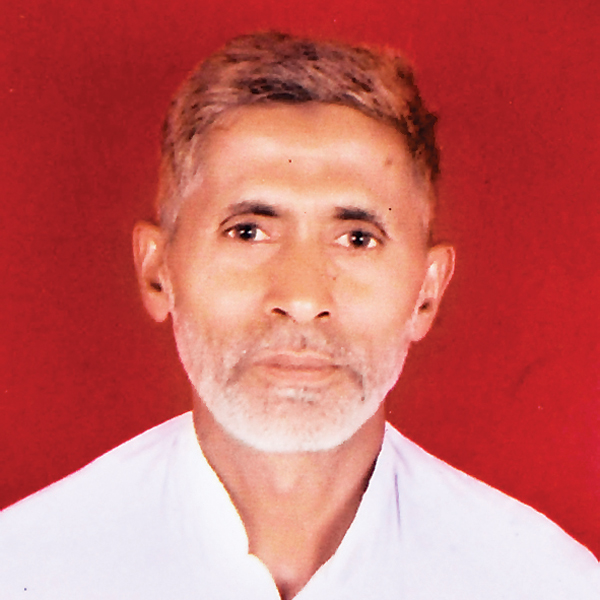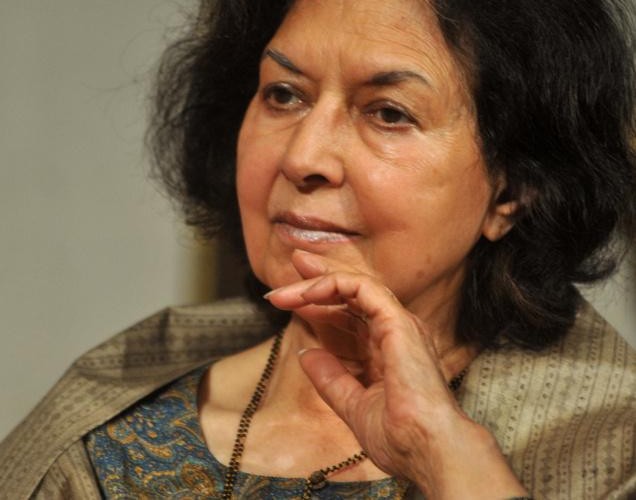When the news about Jawaharlal Nehru’s niece Nayantara Sahgal returning the “prestigious” Sahitya Akademi Award began to trend on Twitter the Twitter handle @AmartyaTalks aptly remarked:
I read that Nehru’s niece has returned Sahitya Akademy Award. Now I am hopefully excited that Nehru’s family will also return the old India.
In her statement, Nayantara Sahgal has said that rationalists and secularists in India are being attacked by the “dangerous distortion of Hinduism known as Hindutva”.
She names authors and anti-superstition activists like M.M. Kulbargi, Narendra Dabholkar and Govind Pansare who were recently killed by alleged Hindu extremist organisations for voicing their opinion against Hinduism and superstition.

The final straw to break the camel’s back, according to her statement, seems to be the lynching of Mohammed Akhlaq on the suspicion of cooking beef at home.
“The Prime Minister remains silent about this reign of terror. We must assume,” she writes, “he dare not alienate evil-doerswho support his ideology.”
“In memory of the Indians who have been murdered, in support of all Indians who uphold the right to dissent, and of all dissenters who now live in fear and uncertainty, I am returning my Sahitya Akademi Award,” she concludes.
To the uninitiated, this might seem like the right thing to do. When the government bears mute witness to the atrocities happening in the society, writers and freethinkers are known to come forward and awaken the public against such a government. The history of the world is replete with such literary movements.
In a normal society, writers like her are the conscience keepers of the society. They say Tolstoy had become so strong due to his writings that even the Czar wouldn’t dare arrest him. Many writers have had to flee their countries to escape persecution.
Even in countries like Saudi Arabia, Pakistan and Bangladesh, writers, journalists, activists and intellectuals (and these days, even bloggers) are publicly flogged and tortured simply because they don’t bend before the establishment.
The complete opposite happens in India.
We have phony intellectuals whose only job is to make sure that a particular dynasty and its various crude offshoots remain in power as long as possible.
Unfortunately, after independence, we never had the literary and cultural Renaissance the country so desperately needed.Instead of writers who could hit at the roots of the morally bankrupt establishment, we have had stooges whose only job has been to whitewash the all-round putrefaction of the Nehru family.
Some have also rightly asked why she had no qualms about accepting the award just two years after thousands of Sikhs were massacred in 1984 under the watchful eye of the Congress party that her extended family has practically owned like a mafia since the independence.

Wasn’t she ashamed that she belonged to a clan that oversaw the murder of so many innocent citizens? Didn’t her soul cry as an esteemed “litterateur” when not even a single culprit was brought to book? Didn’tthe core of conscience rebel against the establishment that gave election tickets to hooligans who led the murderous mobs in 1984?
Police officers who facilitated the killing of Sikh families were promoted by the Congress party according to the book by H.S. Phoolka.
How could Ms. Nayanatara accept the award from a government headed by a person who, instead of reining in the murderous mobs, had said, “When a big tree falls, the earth shakes,” in the wake of Indira Gandhi’s assassination and the subsequent genocide unleashed upon the unsuspecting Sikh population?
Despite being a Kashmiri Pandit (at least according to official records, although references on the Internet tell something else) the writer inside her never rebelled against the Congress government at the Centre that never took a single step to stop the Kashmiri-Pandits’ ethnic cleansing in the Kashmir Valley.
The greatest number of riots have happened under the aegis of the Congress government. The murkiest political intrigues have been perpetrated by the Congress party headed by one or the other Nehru-Gandhi family member.
Skeleton after skeleton is tumbling out of the closets of Subhash Chandra Bose’s and Lal Bahadur Shastri’s deaths and the government-approved surveillance of their families afterwards.
Where was the mighty pen then? Did she return the comforts she got due to her association with the family-name? It was the usual family business. It was not the BJP at the Centre. It was not Narendra Modi who was heading the government during any of those long decades.
The Congress party is so full of sins that a right-thinking writer would not like to touch it even with a barge pole. Every big and small problem the country faces can be easily traced back to the family and the party, which was its extension.
But no, people like Nayantaran ever had a big problem with the existence of one of the most repressive regimes in the world. Yes, there were a few nagging issues here and there, but just as we tolerate mosquitoes in a tropical country, the transgressions of the Congress establishment could be casually brushed aside.
Yes, there were some token protests during the Emergency, but they just remained token protests, nothing lifestyle-threatening.
Talking about Emergency,Nayantara Sahgal was easily able to digest the draconian, forced sterilization of more than 8.3 million Indians, mostly Muslims.
Yet, she had no problem accepting the SahityaAkademi Award from a government that oversaw the killing of thousands of Sikhs and the forced sterilization of millions of Muslims. But her entire world begins to crumble because “Prime Minister Narendra Modi remains silent.”
What exactly is her problem?
It isn’t the world that is tumbling, it is the world of these writers and intellectuals that is tumbling with great speed. It is not just tumbling, it also doesn’t seem to have a hope of ever recovering.
This is what’s really riling them up.
They miss the good old world of leisurely Gymkhana Club parties and lazy strolls on the Lutyens lawns while 99 per cent population of the country reeled under extreme poverty and wretchedness.
They were totally fine with a major chunk of population never having access to food, good education, highways, freedom of expression, cleanliness and quality of life as long as they could go on living their luxurious lives whether in India or abroad.
For these writers and intellectuals, the teeming masses of Indians needed to live in scarcity so that they always had to hold in awe those who had access to all these basic necessities of life.
Terms like justice, equality and dignity belonged to the books, articles and essays these eminent writers and intellectuals wrote; these were not to be provided to the common man and woman struggling interminably even for basic needs like food, shelter and safety.
People like Nayantara Sahgal, directly or indirectly, have constantly colluded with material and non-material forces to maintain status quo.
These people have destroyed their own credibility with their own hands due to their selective spurts of outrage.
The tragedy, which these intellectuals knowingly brush aside, is the human cost the country has had to pay due to the corrupt and immoral practices of political parties by donning the cloak of secularism, progressivism, liberalism, pluralism and every sort of sham pop-ism they can conjure up to hoodwink the public.
Multiple generations have been wasted by the socialist policies blatantly promoted by the godfathers and godmothers of these writers and intellectuals.
Most of the socialist policies were put in place to make the life of the common man and woman as miserable and poverty-ridden as possible and make the lives of those with connections and “reach” as comfortable as possible.
The colloquial phrase “Jiski laathi usi ki bhains” (the buffalo belongs to him who wields the baton) has been immortalized by these the so-called guardians of free speech and inclusivity.
Throughout the last six decades, they have sustained a system that only works for people with money, power and political connections. There is no law and order for the common man. There is no sense of safety for the person walking on the road. There is no access to justice unless you can shell out loads of money.
And these intellectuals are perfectly fine with the entire system being employed to find Azam Khan’s buffaloes,and Muslims and Dalits constantly being exploited in the name of secularism and social justice.
So, have things changed ever since Narendra Modi assumed power?
You can’t say that everything is suddenly great,and in terms of quality of life, the country is going to have to wait for many more years (such is the damage caused by the system underpinned by these writers and intellectuals), but there is something that is fundamentally changing—and that worries these dinosaurs of those dark ages.
People have begun to ask questions.
They can give vent to their frustration either by their political mandate or by using the Internet. In the name of secularism a major chunk of the population was constantly being taken for a ride. That major chunk of population has begun to rise. Intellectual lies can no longer be peddled with impunity.
Historical facts can no longer be twisted because people can access alternative sources of information with little effort. Events cannot be misreported because people can post live updates without having to rely on newspapers, magazines and TV news channels mostly controlled by these writers and intellectuals.
Differing views can be published in the form of books, journals, magazines, blog posts and social media updates. Political and ideological dissent in the intellectual realm can no longer be throttled.
India’s inherent culture and traditional norms are again being valued. The world no longer looks at India as a place of snake charmers, maharajas and people dying of hunger and disease. Poverty and misery can no longer be sold.
New stories about India are being written and these writers don’t know how to come to terms with these new stories. They are so used to writing stories in the old format. Very few want to read them and fewer believe them.
Congress Intellectuals have been reduced to little more than nuisance value.

This is why Nayantara Sahgal feels like returning her award (which was never in the first place given by the current government) and “eminent historians” like Romila Thapar believe that the education infrastructure is being systematically demolished.
So if these individuals are feeling perturbed, then something is happening, something that is good for the country and for the society.
Even if you cannot see the change right in front of you, just because these people are feeling disturbed, you can safely assume that somepositive change is taking place in the country and these people can no longer control what that change should be.
This is why instead of respecting Nayantara Sahgal’s decision of returning her Sahitya Akademi Award, people are ridiculing her.
Amrit Hallan provides professional content writing services. He generally mind his own business, but when he strongly feels about particular issues, he likes to take on the mantle of a journalist and commentator.

